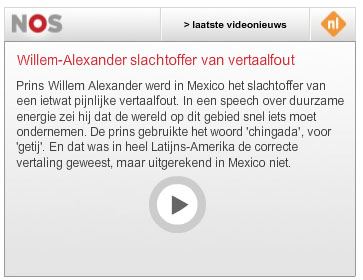When we shout “Viva Mexico Hijos de la Chingada!” we express our desire to live closed off from the outside world, and above all, from the past. In this shout we deny our origins and deny our hybridism.
[Octavio Paz “The labyrinth of solitude: and the other Mexico” (first edition published in 1950 as “El laberinto de la soledad”]
Prince Willem Alexander spiced up his state visit lecture in Mexico on environmental issues on November 4 2009 (as he likes to change his color from orange to green) with this little sentence: “Let me conclude by giving you a Mexican proverb.
“Camaron que se duerme se lo lleva la chingada”.
(intended as “a shrimp that is sleeps is washed away by the tide”)
The rather short speech (a full copy can be found on the web-site of the Dutch Royal House and I kept a copy in PDF format just in case the translation may be lost for posterity) had some other references to the Aztec empire as “children of the sun” linking that to solar energy and the natural partnership of Mexico and the Netherlands as providers of oil and gas and at the same cautioning his audience about the needed restraint in its usage. The word “chingada” does appear in the official State Information Service (RVD) both on the Royals House web site and elsewhere signed © RVD .
It had to be ‘corriente’ instead of ‘chingada’ with its historical connotation of violence as started by conquistador Cortes: molesting, pricking, wounding, killing, the violated mother and many more negative associations.
The prince thus has created himself a new emblematic personality “THE SHRIMP PRINCE” or in Dutch PRINS GARNAAL (with its connotation of the word Prinsgemaal, the Dutch attribute given to the husband of a queen).

A visualization of the Mexican proverb in the version of Willem Alexander, image elements are: the Procaris Mexicana schrimp; the 1519 massacre of Cholula by Cortes his army and allied Tlaxcalteca indians as depicted in the Codex Lienzo de Tlaxcala (ca. 1550-1555). With La Malinche nicknamed La Chingada as a traitor to her own people, pointing where to go. ~ Click picture to have a full size view.
This quotation has been taken from a Youtube copy of a Mexican Television report on this state visit event.
Interesting is how Dutch public television managed to simplify the Mexican connotation of the word “la chingada” and in their stupidity even failed to check their Spanish dictionary, coming up with this blant untruthful translation and subsequent interpretation. The anchorman starts of with explaining what the prince intended to say “he wanted to say ‘a sleeping shrimp is dragged away by the tide’ but because of a little translation mistake” (vertaalfoutje) it became something else completely.” Very diplomatic and refined, the possible translations of the pejorative term ‘chingada’ – as spoken by the prince – are not pronounced by the anchorman, it is only in the subtitles that the Dutch television public can learn what has been said.
The Dutch television caption of the proverb reads: “een slapende garnaal gaat naar de klote” (a sleeping shrimps goes to the bullocks/balls; has a shitty end). A translation that does not honor the scale of Mexican connotations available. The commentator then quickly explains: “The last word does mean in the whole of Latin America ‘tide’, though, except in Mexico, and the translator was ignorant of this fact.” Not only this main national public television station made this completely wrong remark suggesting that in other Latin American countries the word ‘chingada’ has the meaning of ‘tide’, it can be found back in several other television stations and news papers (see note *), hence this source of this misinformation has been ‘on the news wire’, though I could not trace back its origin yet (would be interesting to know if the State Information Service RVD is the source of this). This little episode of royal glory was presented under the header: “Willem-Alexander slachtoffer van vertaalfout” (Willem-Alexander victim of translation mistake). We are thrown back centuries, to times when royals could never be mistaken and when needed put the blame on someone else. I am speaking here not of a holiday outing of some members of a certain family called ‘Van Oranje’, it is a state visit, but in our monarchy the roayls can by constitution not be held responsible for their deeds, which compares badly to – say – the position of government ministers that formerly have to accept full responsibility for their position. This is grotesque! For what is expressed in the original Mexican proverb there are – to my knowledge – only two Spanish words that apply: ‘marea’ and ‘corriente’. There is no relation whatsoever with the meanings of ‘chingada’ and the notion of ‘tide’. All this may have been not intentional fraud, but is yet another expression of what happens when a constitutional monarchy reigns in the wrong century. The high media profile of the House of Orange as pushed through the media upon the whole nation for decades, is haunting millions of sober observers at a frequency of several times a week, both laughable and shameful.
It was not just one Dutch national television channel that twisted the meaning of the translation mistake, almost all channels and newspapers have been busy to cover up the embarrassment with off the point arguments, of which I will give a few examples in Dutch as a footnote (*).
The incident itself is of course of little importance, but the reactions on it tell us something on how Dutch media function, how lazy our journalists are, that they even fail to harvest the power of the ubiquitous internet search machines. When one digs a bit deeper there is some sense in the mistake and why it has been made. It must have all started with the prince himself or his ghostwriter to add some local reference into a state visit speech (a standard thing to do in diplomacy). In the old days of speech construction it was dictionaries of proverbs that would be referenced, now we have the internet and Wikiquote is a handy tool and it has a page called “Mexican proverbs” which has about fifty of them (mind you the same proverb is used in Chile and Venezuela and maybe common in the whole of Spanish Latin America). And, yes there it is:
“Camarón que se duerme se lo lleva la corriente”
-
“Shrimp that sleeps gets carried by the tide”
-
Meaning, if you get distracted (or asleep), you will be left behind; or you snooze you lose.
So maybe the prince or his ghostwriter did find this page, quoted just the English version and then passed that on to the state functionaries responsible for the royal Mexican trip, in this case the Ministry of Economic Affairs (why else would the royals go there?). The ministry passed it on to a translator, who is said to be an Argentinian (maybe a friend or associate of the prince’s wife Maxima). So probably the English rendering of a Mexican Spanish proverb had to be translated back into Spanish, without recourse to the original Spanish version. One commentor in the blogosphere (Proz.com/the translator workplace) asked himself how the word ‘corriente’ could be mixed up in any way with the word ‘chingada’: “How could the translator mistake “corriente” with “chingada”? They’re no homonyms, letters starting with different alphabets, completely different pronunciations, and I can’t come up with any similarity among these two words…” and that seems to be a correct observation. What was it that drove the translator to the word chinga…? It may be that this kind of recommandation was in his mind, as explained on the useful web site “Just Landed” with good and quick advice how to appear to be groovy within minutes in a foreign country, explaining the difference between Mexican Spanish and spanish Spanish:
A Mexican slang word you will hear continuously is the word chingar – which can be replaced by the more polite word fregar depending on who you are talking to. Depending on the circumstances, chingar can describe almost any situation or emotion you can think of. Here are some examples:
- está de la chingada – this is shit
- es una chingadera – this is terrible
- no me chingues – don’t get on my nerves
- está chingón – this is great
Some Mexicans go as far as seeing the word chingar as one of the utmost expressions of Mexican feelings and culture, and you will definitely be seen as more ‘Mexican’ when using it appropriately.
Still the web page also warns: “However, the first meeting with your new girlfriend’s parents is NOT an appropriate situation for practicing your new vocabulary, though as a foreigner you are likely to be forgiven your first few mistakes with Mexican vocabulary.”
All this has not answered yet the primary question, why and how this could happen. There must be some reason for the translator to have offered this version. There are two possible options (as we will leave out a pure change voodoo-typo at some stage in the speech production process, or an even more improbable option that a malign inspiration or hangover lapses made Willem-Alexander produce the wrong word at the wrong moment). The options are:
1) sabotage
2) poetic intervention
1)
The sabotage option needs some fantasy, but, still has some historical reality basis. As several sources mention the Argentine nationality of the translator, in theory that person could have a crunch against the direct relation between the Royal House of Orange and the Argentin Zorreguieta famliy and its pater famillias Jorge Horacio Zorreguieta Stefani, Under-Secretary of the Ministry of Agriculture from 1976 tot 1981 of the military regime of Videla. The inventive ways in which Jorge Zorreguieta has been downplaying his involvement in the regime that produced the Dirty War with its thousands of disappeared/murdered persons, could have been the motive for what in military terms is called ‘a target of opportunity’. The translator may have thought about the 1100 people disappeared on and near the estates of landowner Zorreguieta in the Tucumé region or about the case of the son of Marta Sierra ( a person known to Zorreguieta) that disdappeared and for which he has been called by the tribunal to attest; without a real court case against him, which means his guilt has not been established, but at the same which fact has frustrated several people who think the contrary. So this word ‘chingada’ might have been slipped in purposely to upset the prince to have a little revenge, with the perpetrator possibly thinking “ay… hijo de la chingana!” (son of a bitch) got you….
2)
It is a poetic intervention of the translator who associated the washing away by the tide of a shrimp with a colloquial expression of being ‘fucked up’ as the washing or carrying away of a small shrimp by a strong tide is indeed a violent event. The verb ‘llevar’ can also be found in the expression “Me lleva la chingada” (to say that something really bad is happening to me), so this might have been the impetus for the translator to render the proverb in such an unusual way. “se lo lleva la chingada” can also be translated as is getting lost, like in the expression “El que se casa se lo lleva la chingada” (The one who gets married is lost). On the often very useful web site “Urban Dictionary” a street level collection of words and expressions for globetrotters an exposé on further combinations with the word ‘chingada’ can be found; a more serious overview is on a Wikipedia page about Spanish profanity (Chingar comes from the Caló (Spanish Romani) word čingarár, meaning “to fight and in Mexico its meaning was extended to ‘to fuck someone’ or ‘to make a mistake’, with many more meanings added over the centuries … Still I have left out till now a more fundamental association of this word which has been formulated half a century ago by the national writer of Mexico Octavio Paz which explains the strong reactions of the audience on the word and the followup in the Mexican news media.
It is the historical figure of an indian noble lady by the name of Malintzín Tenepal that had been sold by her mother as a slave to another indian tribe and was later presented as a gift to the Spanish invaders. She became an interpreter for the conquistador Hernán Cortes first translating between different indian languages to Maya – that could be understood by a Spanish priest. Later she learned to interpret directly to Cortes who found her indispensable for his quest for power. She became a concubine of Cortes and bore him a child one of the first mestizas children. She is both said to have helped to trick and force her own nation into submission and to have prevented much worse slaughter and destruction. She was known by other names: Doña Marina and La Malinche. She is a complicated figure, traitor and protector, both mother and whore, the last things earned her the nickname La Chingada (the screwed one). It is Octavio Paz who summarizes after centuries the symbolic meaning of ‘La Chingada’: “The idea of La Chingada functions not only as a curse, but as a reminder of the power of the interpreter, even five hundred years after the conquest.” (**) Paz explains the indentity crisis of the modern Mexican: colonial Spain vanished, collapsed indian empires, mixed desendence, mulatto, criollo, mestizo, zambo, a past out of reach, a modern western state form that does not fit, in short “a fucked up nation”: Chingaderas!

José Clemente Orozco's (1883-1949) mural made in the period 1923-1926 in the Antiguo Colegio de San Ildefenso in Mexico City, depicting Cortés (1485-1547) and La Malinche (1505-1530), mentioned by Octavio Paz in 1950 and once more interpreted by Tere Romo in a study published in 2005 (***): "Orozco subtly addresses the inherent power relation of conquest. While Cortés holds one of her hands, Malinche casts her eyes downward toward the native figure on the ground. Cortés's restraining gesture (with his other hand) clearly indicates that she too, is under control of his will."
The “power of the interpreter” once again, not on a macro scale but on a micro level, surfacing during a silly incident. Lots of symbolic meaning, nevertheless. The odd combination of the Mexican proverb with the sleepy shrimp washed away by the tide and the Mexican universe expressed in the word “la chingadera” still has not been explained by all this. What did the translator really had in mind? Should I reconsider the option of the Prince performing some provocative practical joke (in his later years his father Prince Claus was renown for having done so at a few occasions). And then, as I kept searching and started to filter away any recent repetition of the by now famous line of prince Willem-Alexander, a few references from 2006 came up with a song having exactly the same text line on the web site of ‘Artist direct‘: “Camaron que se duerme se lo lleva la chingada” published on a CD with the title “En Vivo, Vol.2 (Ultima).” I tried to play the tune as there was a small button with a loudspeaker on the web page, but it was only an announcement of a new set to be played during a life performance … I did find several other web sites selling the same CDs, but same thing, the song itself could not be listened to. After many more attempts I found a web site with a telephone number of the music group … in the USA and so I called. A man with a Spanish accent came on the pohone but he hung up in seconds without giving me a chance to explain the cause of my call. So now I am waiting if an email message may be answered by any of the group members. Could it be a sheer chance event, is there any relation? The group ‘Sonido Bravo’ seems to be a ‘corrido’ music group working with electronic instruments and light effects, recycling the traditional story telling songs of Mexican common people in a 21st century dressing. I wonder which tale the Sonida Bravo song tells, we have to wait for more information to come in.

Web site "Artists Direct" which list the CD with the song/work "Camaron Que Se Duerme Se lo Lleva La Chingada" by the group "Sonido Bravo" ; the sample that can be played is very short and seems to be just an announcement. It could be that there there is more than one group with this name, on Youtube several videos of a group called "Sonido Bravo" can be found, but I could not find out if that is the same as on the sample CD as presented on this web page. Click image for full view.
I may close off with another Mexican proverb – which will be correctly translated as I take a serious academic publication as my source –
“En boca cerrada no entran moscas” (no fly will get in a closed mouth). (****)
Lets be on the alert for more information to find out why the Shrimp Prince did catch a fly, maybe he should have better kept his mouth shut.

National Dutch news (NOS Journaal): "Prince Willem Alexander became a vicitim of a somewhat painful translation mistake. In a speech about renewable energy he said that the world had to act upon this diligently. The prince used the word 'chingada' for 'tide'. And that would have been in the whole of Latin America the correct translation, but by chance not so in Mexico." ~ Click picture to have a full size view.
In other words a painful mistake by a royal is multiplied by the national news, maybe to lessen the pain of the prince, who is now not the only one making mistakes.

The start page on the offical web site of the Dutch national news NOS Journaal; click picture above to see and hear the video in Dutch. I will also copy this video for posterity and post it on Youtube... if it is not there already.
Mexican television rendering of the same event… most polite, but they would not let go the opportunity to have some fun with the Dutch ‘klompen-diplomacy’ (wooden shoet diplomacy of the Dutch).
Vodpod videos no longer available.
===========
(*)
– Algemeen Dagblad: “Voor het woord getij – ‘corriente’ – gebruikte hij echter het woord ‘chingada’. ‘Chingada’ betekent ‘naar de kloten gaan’ of ‘je wordt verneukt’. In heel Zuid-Amerika is chingada ingeburgerd in het dagelijkse taalgebruik. Alleen uitgerekend in Mexico heeft het een grove lading. // Een Argentijn – niet prinses Máxima – die de prins hielp met zijn speech, was daarvan niet op de hoogte. Het voor de toespraak verantwoordelijke ministerie van Economische Zaken heeft de prins inmiddels excuses aangeboden. Het ministerie laat weten dat de speech van de prins door een van haar medewerkers is voorbereid op en dus ook de verantwoordelijkheid is van dit departement. De dubbele betekenis van de uitdrukking is ,,helaas” niet doorzien, aldus de zegsman.”
– RTL-Nieuws: “Hij dacht een Mexicaanse uitdrukking te gebruiken: ‘een slapende garnaal wordt meegenomen door het getij’. Voor het woord getij gebruikt hij ‘chingada’. // Dat woord betekent in heel Zuid-Amerika getij, maar uitgerekend in Mexico heeft het een andere lading. Het Mexiaanse publiek hoorde de prins zeggen dat de garnaal ‘naar de klote gaat’. Hij had eigenlijk ‘corriente’ moeten zeggen. // Chingada is in Mexico straattaal voor neuken, verneukt of naar de kloten gaan.”
– Joop.nl (een nieuw blog gelieerd aan de VARA dat het nieuws zegt kritisch te gaan volgen wist het niet verder te brengen dan dit: “Camaron que se duerme, se lo lleva la chingada” betekent namelijk niet dat “de garnaal die slaapt, wordt meegenomen door het getij” (wat de prins vermoedelijk probeerde te zeggen), maar dat die garnaal “naar de klote gaat”. Zijn toehoorders kunnen er in ieder geval hartelijk om lachen.”
– NRC/Handelsblad heeft wel wat meer onderzoek gedaan, en weet de bron van de tekst juist te duiden maar komt niet toe aan de culturele betekenis van het woord en de moeilijk te verklaren keuze van de Argentijnse vertaler: “Milenio en Excélsior, twee landelijke dagbladen, zetten de woorden van de prins op de voorpagina. „De prins van Nederland spreekt tot het Mexicaanse volk.” In de krant Reforma werd niet uitgesloten dat de prins een bekende tequilabar in Mexico-Stad had bezocht. „Of iemand heeft een grap met hem uitgehaald, of de prins van Nederland wilde zijn boodschap duidelijk overbrengen. // Geen improvisatie // De prins improviseerde niet, maar sprak een door het Nederlandse ministerie van Economische Zaken geschreven toespraak uit, zo liet dit departement gisteren weten. Volgens het ministerie, waarvan bewindsvrouwe Maria van der Hoeven (CDA) eveneens bij de bijeenkomst aanwezig was, is de betreffende tekstschrijver een Argentijn, die de expliciete betekenis van chingada niet zou hebben gekend.”
(**) The labyrinth of solitude: and the other Mexico by Octavio Paz
(***) Feminism, nation and myth: La Malinche By Rolando Romero; 2005 p.146
(****) A dictionary of Mexican American proverbs By Mark Glazer; page xv

